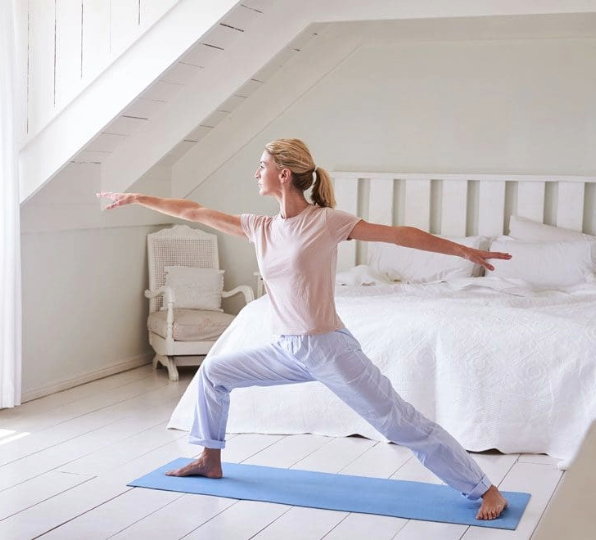Introduction:
Exercise is well known to improve general health and the quality of one’s sleep, but it’s a common misconception that working out right before bed will interfere with sleep. Contrary to popular belief, there is a more complex relationship between late-night exercise and the quality of sleep. In this blog post, we’ll dispel common misconceptions, look at the science underlying how late-night exercise can impact your restorative sleep, and assess the impact of exercise before bed on the quality of your sleep.
1. Exercising Before Bed Leads to Poor Sleep Quality
The belief that exercising before bed leads to poor sleep quality is a common misconception that has been perpetuated for years. However, the relationship between late-night exercise and sleep quality is more nuanced than commonly thought. Research suggests that factors such as the timing and intensity of exercise play a significant role in determining its effects on sleep.
Contrary to popular belief, engaging in moderate-intensity exercise in the evening may not necessarily disrupt sleep patterns and can even promote better sleep quality for some individuals. Several studies have found that individuals who exercise regularly, regardless of the time of day, tend to experience improvements in sleep duration and quality compared to sedentary individuals. Additionally, the release of endorphins and reduction in stress hormones associated with exercise may contribute to feelings of relaxation and well-being, which can facilitate the transition to sleep.
However, the effects of late-night exercise on sleep quality can vary depending on individual factors such as fitness level, sensitivity to caffeine and stimulants, and sleep habits. Intense or vigorous exercise close to bedtime may increase heart rate, body temperature, and adrenaline levels, making it difficult for some individuals to wind down and fall asleep afterward. Additionally, the activation of the sympathetic nervous system during strenuous exercise may delay the onset of REM sleep, leading to disruptions in sleep architecture and reduced sleep efficiency.
The timing of exercise relative to bedtime is also an important factor to consider when assessing its impact on sleep quality. Some research suggests that exercising at least three hours before bedtime may be optimal for promoting better sleep quality, as it allows sufficient time for the body to cool down and for adrenaline levels to return to baseline. However, individual responses to late-night exercise can vary, and some people may find that they can exercise closer to bedtime without experiencing negative effects on sleep.
It’s worth noting that while late-night exercise may not necessarily impair sleep quality for everyone, certain individuals may still be more sensitive to the stimulating effects of exercise and may benefit from adopting a more conservative approach to evening workouts. Incorporating relaxation techniques such as yoga, stretching, or meditation after exercise can help promote relaxation and prepare the body for sleep.
2. Timing of Exercise
The timing of exercise plays a crucial role in its effects on sleep quality. While physical activity offers numerous benefits for overall health and well-being, exercising too close to bedtime can disrupt sleep patterns and make it harder to fall asleep. Understanding the relationship between exercise timing and sleep can help individuals optimize their workout routines to promote better sleep quality.
Exercising too close to bedtime can have several adverse effects on sleep. Physical activity increases heart rate, body temperature, and adrenaline levels, all of which are counterproductive to the relaxation and physiological changes necessary for initiating sleep. Intense or vigorous exercise stimulates the sympathetic nervous system, which is responsible for the body’s fight-or-flight response, leading to increased alertness and arousal. Additionally, exercise releases endorphins and other neurotransmitters that promote wakefulness and can interfere with the body’s natural sleep-wake cycle.
Consequently, individuals who engage in late-night exercise may find it challenging to wind down and transition to sleep afterward. Sleep onset latency, or the time it takes to fall asleep, may be prolonged, and sleep efficiency may be reduced, resulting in fragmented sleep and poorer overall sleep quality. Moreover, the stimulating effects of late-night exercise can disrupt the architecture of sleep, leading to fewer periods of restorative deep sleep and REM sleep.
In contrast, exercising earlier in the day, such as in the late afternoon or early evening, can promote better sleep by allowing time for the body to cool down and relax before bedtime. Moderate-intensity exercise performed several hours before bedtime has been shown to have positive effects on sleep quality, including improvements in sleep duration, sleep efficiency, and perceived sleep quality. By exercising earlier in the day, individuals can avoid the stimulating effects of exercise on the sympathetic nervous system and allow their bodies to gradually transition into a state of relaxation in the evening.
Furthermore, regular physical activity has been associated with better sleep quality and reduced risk of sleep disorders such as insomnia and sleep apnea. By incorporating exercise into their daily routines, individuals can establish healthy sleep-wake patterns and promote overall sleep health. However, it’s essential to listen to your body and adjust your exercise routine based on individual preferences and responses to physical activity.
3.Intensity of Exercise
The intensity of exercise plays a critical role in its effects on sleep quality. High-intensity exercise, characterized by vigorous cardio or strength training, can have a more significant impact on sleep compared to moderate-intensity or low-intensity exercise. Understanding how different levels of exercise intensity influence sleep can help individuals tailor their workout routines to promote better sleep quality.
High-intensity exercise activates the sympathetic nervous system and increases cortisol levels, both of which can interfere with the body’s ability to transition into a relaxed state conducive to sleep. The sympathetic nervous system is responsible for the body’s fight-or-flight response, triggering increases in heart rate, blood pressure, and adrenaline levels to prepare the body for physical exertion. As a result, high-intensity workouts can leave individuals feeling energized and alert, making it challenging to wind down and fall asleep afterward.
Moreover, high-intensity exercise elevates cortisol levels, a hormone involved in the body’s stress response. Cortisol helps regulate metabolism, inflammation, and immune function, but chronically elevated cortisol levels can disrupt the body’s natural circadian rhythms and interfere with sleep patterns. Cortisol levels typically peak in the early morning hours to help wake the body up and decrease gradually throughout the day, reaching their lowest levels at night to promote relaxation and sleep. However, engaging in intense exercise late in the day can disrupt this natural decline in cortisol levels, leading to difficulties in falling asleep and staying asleep.
Research has shown that individuals who engage in high-intensity exercise close to bedtime may experience longer sleep onset latency, reduced sleep efficiency, and poorer overall sleep quality compared to those who exercise at lower intensities earlier in the day. Additionally, the stimulating effects of high-intensity exercise on the sympathetic nervous system and cortisol levels can disrupt the architecture of sleep, leading to fewer periods of deep sleep and REM sleep, which are essential for restorative rest and recovery.
In contrast, moderate-intensity and low-intensity exercise may have less pronounced effects on sleep quality, as they are less likely to trigger the same level of physiological arousal and stress response as high-intensity exercise. Moderate-intensity activities such as brisk walking, cycling, or swimming can promote relaxation, reduce anxiety, and improve mood, all of which can contribute to better sleep quality. Similarly, low-intensity activities such as gentle stretching, yoga, or tai chi can help calm the mind and body, making it easier to unwind and prepare for sleep.
4.Benefits of Exercising Earlier in the Day
Exercising earlier in the day offers numerous benefits for sleep quality and overall well-being. Whether it’s in the morning or afternoon, engaging in physical activity earlier in the day can have a positive impact on various aspects of sleep, including sleep onset, duration, efficiency, and overall sleep quality. Understanding the advantages of exercising earlier in the day can help individuals establish healthier sleep habits and optimize their nightly rest.
One of the key benefits of exercising earlier in the day is its positive effect on sleep onset, or the time it takes to fall asleep. Morning or afternoon exercise can help regulate circadian rhythms, the body’s internal clock that influences the sleep-wake cycle. Exposure to natural light and physical activity during the daytime helps synchronize the body’s circadian rhythms, promoting wakefulness during the day and enhancing the body’s ability to initiate sleep at night. By aligning physical activity with the body’s natural rhythms, individuals can improve their sleep onset and reduce the time it takes to fall asleep.
Additionally, exercising earlier in the day can contribute to better sleep duration, or the total amount of time spent asleep. Regular physical activity has been shown to increase total sleep time and improve sleep continuity, resulting in longer and more restful nights of sleep. Morning or afternoon exercise can help expend energy, reduce feelings of restlessness, and promote feelings of tiredness later in the day, making it easier to achieve a full night of sleep. By incorporating exercise into their daily routines, individuals can establish healthier sleep patterns and ensure adequate sleep duration.
Moreover, morning or afternoon exercise can enhance sleep efficiency, which refers to the percentage of time spent asleep while in bed. Exercise has been linked to improvements in sleep architecture, the organization of different stages of sleep throughout the night. By promoting deeper and more restorative sleep stages, physical activity earlier in the day can increase sleep efficiency and maximize the restorative benefits of sleep. Individuals who exercise regularly may experience fewer awakenings during the night and a higher proportion of time spent in restorative sleep stages, leading to better overall sleep quality.
In addition to its direct effects on sleep, exercising earlier in the day can also have positive effects on mood and overall well-being, which can further contribute to better sleep quality. Physical activity stimulates the release of endorphins and other neurotransmitters that promote feelings of relaxation, happiness, and well-being. By starting the day with exercise or incorporating physical activity into their daily routines, individuals can enhance their mood, reduce stress and anxiety, and promote a sense of calm and relaxation later in the day, all of which can support better sleep quality.
5.Tips for Exercising Before Bed
Exercising before bed can be beneficial for some individuals, but it’s essential to choose activities and strategies that promote relaxation and support a smooth transition into sleep. If you prefer to exercise in the evening, here are some tips to help you optimize your workout routine and improve your sleep quality:
- Choose Low-Intensity Activities: Opt for low-intensity exercises that promote relaxation rather than high-intensity workouts that may leave you feeling wired and alert. Consider activities such as yoga, gentle stretching, or a leisurely walk around the neighborhood. These types of exercises can help calm the mind and body, making it easier to unwind and prepare for sleep.
- Avoid Stimulating Workouts: Steer clear of activities that are too stimulating or energizing close to bedtime. High-intensity cardio, intense strength training, or competitive sports can increase adrenaline levels and stimulate the sympathetic nervous system, making it harder to relax and fall asleep. Save these types of workouts for earlier in the day when they won’t interfere with your sleep.
- Allow for a Cool-Down Period: After completing your evening workout, allow time for a cool-down period to help lower your body temperature and promote relaxation. Gentle stretching or foam rolling can help release tension in the muscles and facilitate the transition from activity to rest. Taking a warm bath or shower can also be soothing and help prepare your body for sleep.
- Pay Attention to Timing: Experiment with different exercise timings to find what works best for your body and sleep needs. Some individuals may find that exercising too close to bedtime disrupts their sleep, while others may not experience any adverse effects. Pay attention to how your body responds to evening workouts and adjust your schedule accordingly.
- Listen to Your Body: It’s essential to listen to your body and prioritize rest if you’re feeling fatigued or overexerted. Pushing yourself too hard during evening workouts can lead to increased stress and anxiety, which can negatively impact sleep quality. Be mindful of your energy levels and choose activities that support relaxation and recovery.
- Create a Relaxing Bedtime Routine: Pair your evening workout with a relaxing bedtime routine to signal to your body that it’s time to wind down. Engage in activities such as reading, meditation, or gentle stretching to help quiet the mind and prepare for sleep. Avoid screens and stimulating activities that can interfere with melatonin production and disrupt your sleep-wake cycle.


Conclusion:
In conclusion, exercising before bed does not necessarily lead to poor sleep quality for everyone. While high-intensity exercise close to bedtime may interfere with sleep onset and quality, moderate-intensity or low-intensity exercise earlier in the day can promote better sleep. It’s essential to consider individual factors and preferences when determining the best exercise timing for optimal sleep. By understanding the relationship between exercise and sleep and making informed choices, you can enjoy the benefits of physical activity while supporting healthy sleep habits.












